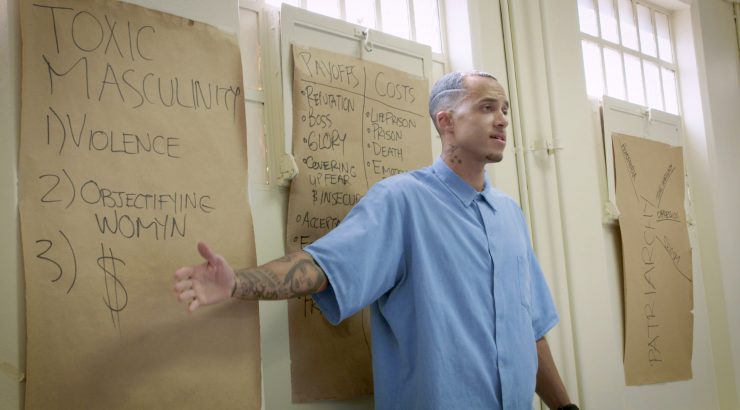
Breaking Chains: The Power of Feminism in the Inmate-Led ‘Success Stories’ Program at Soledad Prison
October 21, 2024
“We get to choose what kind of men to be in life. The question is, ‘what kind of man will you be?’”
It has been 6 years since Richie Reseda was released from prison and 6 years since the documentary The Feminist on Cellblock Y was released on CNN. On October 3, 2024, Wilkinson College, the Women’s and Gender Studies, Delp-Wilkinson Peace Lecture Series, Department of Sociology, and MA International Studies programs hosted a screening of the documentary and a follow-up Q&A with Reseda, and two, also previously incarcerated at the same facility as Reseda as part of Wilkinson’s Engaging the World: Leading the Conversation on Gender and Sexuality Series.
The Feminist on Cellblock Y follows a group of inmates at an all-male prison in Soledad, California, as they go through an inmate-led program called Success Stories. This is a 12-week program that aims to build “a world free of prisons and patriarchy.” Founded by Reseda and Charles Berry, Success Stories is a curriculum designed to help inmates identify and deconstruct patriarchy, and unpack what it really means to be a feminist. Through feminist literature from authors like Bell Hooks, and facilitated discussion, the program “challenges men to confront patriarchy as a means of rehabilitation,” according to the documentary.
“Everyone wants to be connected,” Reseda said. “It makes sense why people are anti-feminist. The world is anti-feminist…if [someone] is against what I’m saying, their thinking is in the patriarchy,” he said.
From a young age, many men are taught that they’re expected to be a certain way.
Once, as a kid in school, Success Stories participant Benjamin* got teased by a boy twice his size for his outfit. As a response, Benjamin fought him. Subsequently, he got arrested. Benjamin explained that because he was always taught that to be a man, you needed to assert yourself, physically. And when your insecurities are threatened, physical dominance is the answer. “We’re told we have to be tough guys,” Benjamin said. “By the time I was told that I didn’t have to be, it was too late.”
Most of the inmates in this program shared this same sentiment: to be a man, you need to embrace toxic masculinity.
The painful costs of being dominated by the patriarchy include toxic relationships, life sentences, and objectifying humans – which then in turn can cause someone to take another human’s life.
“My students were very moved and enlightened by their experience of the film and Richie Reseda’s workshop. To see men reading feminist theory while incarcerated, teaching it to others, and trying to enact feminist praxis, makes for a unique viewing and learning experience indeed,” said Professor CK Magliola, Director of the Women’s and Gender Studies Minor Program.
In the Q&A session following the documentary screening, Graham*, Jaz*, and Reseda shared their sentiment. They said that our current culture and society is rooted in patriarchy. “We built a culture around it because the more people that do it, it’s lit! Everyone will see the culture,” Reseda said. But now, it’s time to change.
Through Success Stories, they’re setting a new culture.
According to Reseda, there were a total of 2,000 people in the Soledad prison yard. Six hundred of those men graduated from this program. This program gave men the opportunity to look inwardly and address how the patriarchy has influenced their lifestyles personally. Once more and more men see the community around them take this step, they’ll follow suit. As a result, the culture will continue to shift.
“By opening up that unhealed wound, someone else is getting healed with me,” Benjamin said.
(*Last name not given for these participants)

